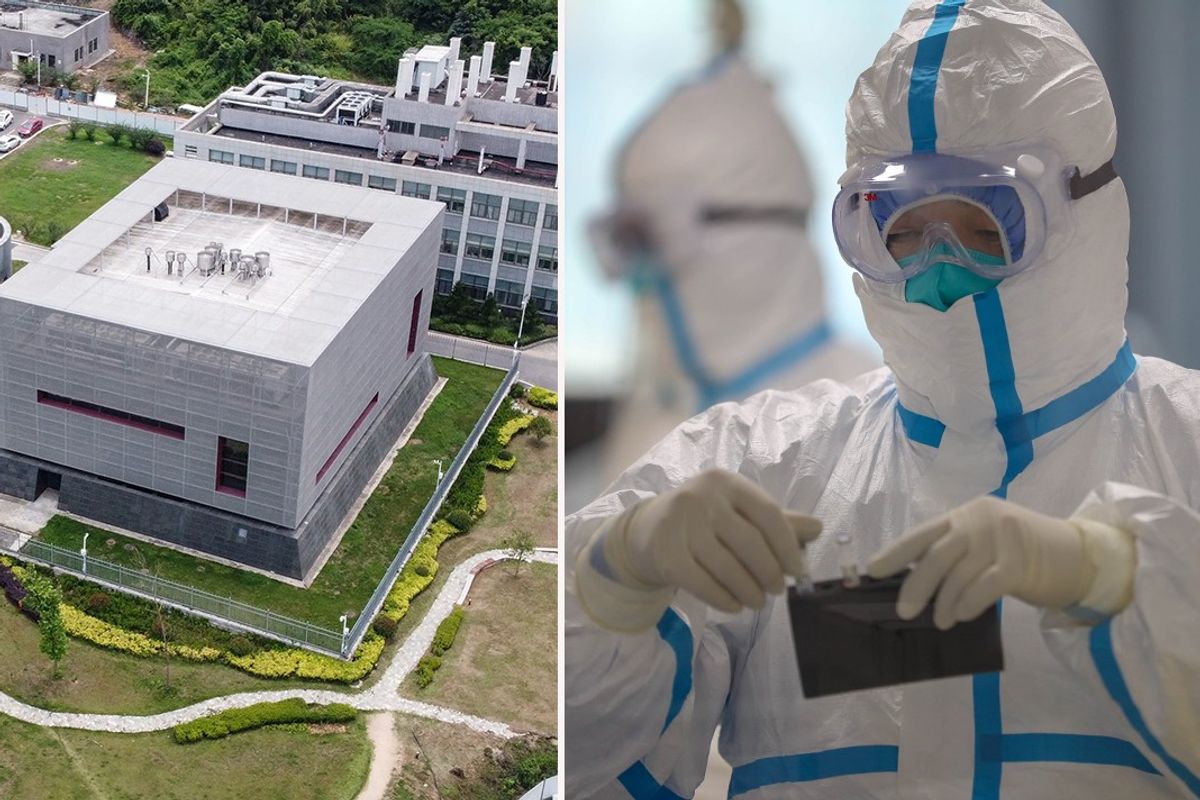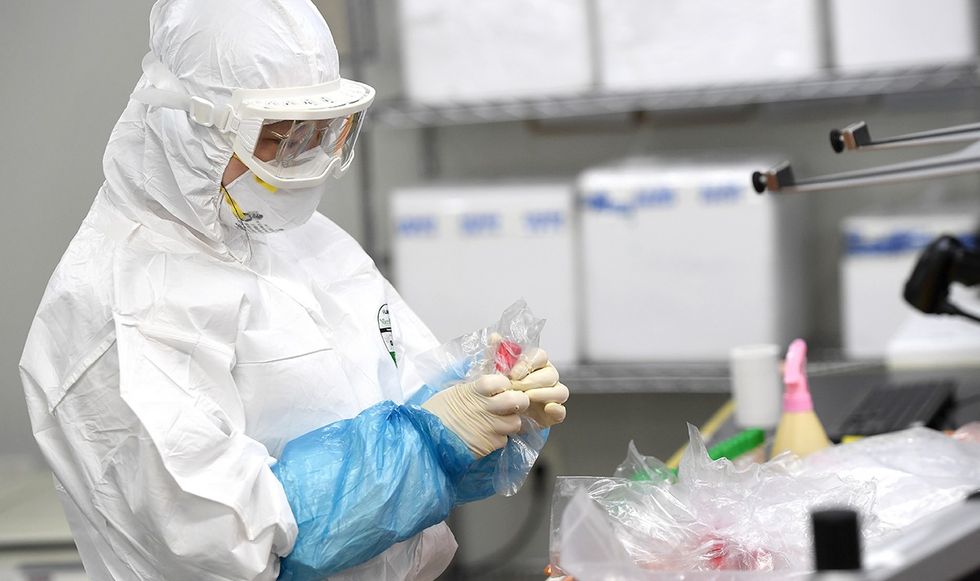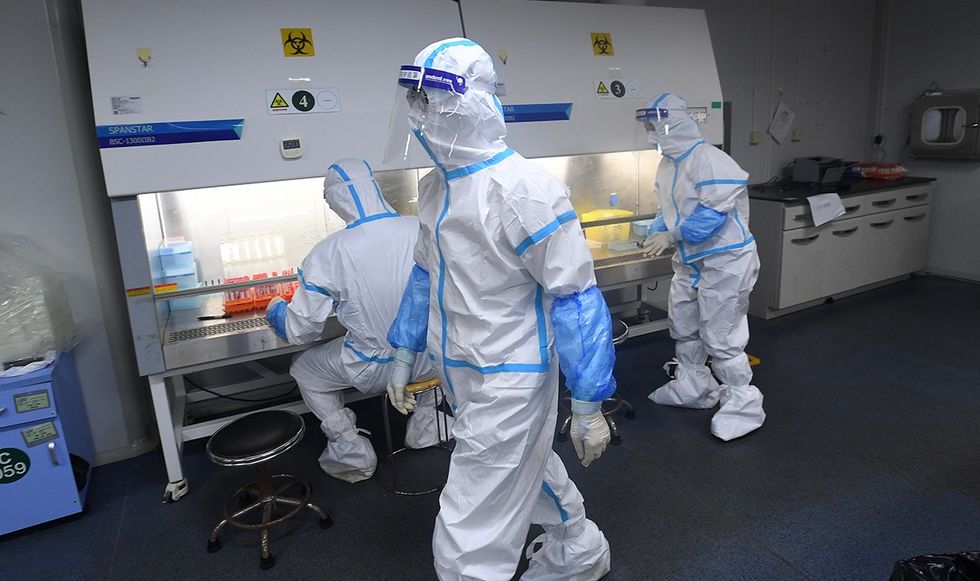
Covid likely originated from Wuhan lab, scientists say after running a risk analysis on the cause of the global pandemic in 2020.
The lab leak theory was initially dismissed as a fringe conspiracy theory but research into the origins of Covid has brought it into mainstream debate.
Most studies initially focused on a zoonotic event (a spillover from animals to humans). This led researchers to the wet market in Wuhan, where cases of the virus were first reported.
However, new research published in the journal Risk Analysis examined the likelihood of an unnatural origin (i.e. from a laboratory.)

An Australian research team used an established risk analysis tool called the Grunow-Finke assessment to create a likelihood scale for possible pandemic causes.
The likelihood of Covid having an "unnatural" origin scored high in the assessment, which was based on a range of criteria, such as the proximity of the first reported cases to both the Wuhan Institute of Virology (WIV) and the Wuhan Center for Disease Control and Prevention (WHCDC).
Doctor Xin Chen, a researcher at the University of New South Wales (UNSW) in Australia, said: "The WIV had been conducting experiments involving SARS-like coronavirus in bats since 2010.
"One of the bat viruses being studied at the WIV shares a 96.1% homology [match] with SARS-CoV-2, something which was only revealed after the pandemic began.
"The WIV was only eight miles away from the Huanan Seafood Wholesale Market, where some of the initial cases were linked to."
The WHCDC was also studying coronaviruses, and on December 2, 2019, less than a month before the first infections, it moved to a location 280m from the Huanan Seafood Wholesale Market.
"A move may have increased the chance of a laboratory accident."
Doctor Chen added that although some scientists use the outbreak at the wet market as an indication of a "natural" or zoonotic origin, several of the first infected people had not visited Huanan.
"This points to the possibility that Huanan was a source of an amplification event, rather than the origin of SARS-CoV-2," he said.
"It is also worth noting that evidence of an intermediary animal host – necessary for this theory – is lacking."
LATEST DEVELOPMENTS
- Doctor Q&A: Can supplements help arthritis?
- World's most deadly infection on the rise
- Cheap supplement boosts memory in weeks

The team also highlighted "unusual" actions by scientists working at the WIV as a factor pointing to a lab leak origin of Covid-19.
Doctor Abrar Chughtai, an epidemiologist at the University of New South Wales, explained: "In September 2019, control of the WIV lab was handed over from civilian to military command and control, and a contractor was hired to renovate the ventilation system within the facility.
"Simultaneously, for reasons unknown, the WIV removed a large virus database containing approximately 20,000 specimens from bats and mice that had previously been accessible to the public.
"It is unclear whether the database included sequences that could be relevant to the origin of SARS-CoV-2 and whether any attempt was made to cover it up."
He added that "not all requested information", such as laboratory records, was made available to the team from the World Health Organisation tasked with investigating the origins of Covid-19 in 2021.
Doctor Chughtai also pointed to instances of "poor" biosecurity procedures at the WIV.
"Some scientists did not follow proper protective equipment protocols while handling bats and were bitten by them," he said.
"And, in early November 2019, some staff members from the institute were hospitalised with Covid-19-like symptoms."
The study admits that its Grunow-Finke assessment cannot prove that Covid-19 leaked from one of the two labs in Wuhan.
However, it also argues that the risk factors outlined throughout the assessment are compelling enough to warrant a further investigation.
Doctor Chen said: "Laboratory accidents are common, and, if the pathogen in question is highly contagious, it is possible that an accidentally infected worker can set off an epidemic in the community.
"The fact that the first cluster of cases were in the vicinity of a world leading coronavirus laboratory, known to be experimenting on SARS-like viruses, as well as a second lab which was also working on coronaviruses, points to an unnatural origin."
It comes after a top World Health Organisation (WHO) official said the agency should never have dismissed the Covid lab leak theory in favour of Beijing's frozen food origin story.
Last year, Professor Marion Koopmans, a world-renowned virologist, acknowledged the WHO's decision "was not smart".
from GB News https://ift.tt/brIRWHQ

Covid likely originated from Wuhan lab, scientists say after running a risk analysis on the cause of the global pandemic in 2020.
The lab leak theory was initially dismissed as a fringe conspiracy theory but research into the origins of Covid has brought it into mainstream debate.
Most studies initially focused on a zoonotic event (a spillover from animals to humans). This led researchers to the wet market in Wuhan, where cases of the virus were first reported.
However, new research published in the journal Risk Analysis examined the likelihood of an unnatural origin (i.e. from a laboratory.)

An Australian research team used an established risk analysis tool called the Grunow-Finke assessment to create a likelihood scale for possible pandemic causes.
The likelihood of Covid having an "unnatural" origin scored high in the assessment, which was based on a range of criteria, such as the proximity of the first reported cases to both the Wuhan Institute of Virology (WIV) and the Wuhan Center for Disease Control and Prevention (WHCDC).
Doctor Xin Chen, a researcher at the University of New South Wales (UNSW) in Australia, said: "The WIV had been conducting experiments involving SARS-like coronavirus in bats since 2010.
"One of the bat viruses being studied at the WIV shares a 96.1% homology [match] with SARS-CoV-2, something which was only revealed after the pandemic began.
"The WIV was only eight miles away from the Huanan Seafood Wholesale Market, where some of the initial cases were linked to."
The WHCDC was also studying coronaviruses, and on December 2, 2019, less than a month before the first infections, it moved to a location 280m from the Huanan Seafood Wholesale Market.
"A move may have increased the chance of a laboratory accident."
Doctor Chen added that although some scientists use the outbreak at the wet market as an indication of a "natural" or zoonotic origin, several of the first infected people had not visited Huanan.
"This points to the possibility that Huanan was a source of an amplification event, rather than the origin of SARS-CoV-2," he said.
"It is also worth noting that evidence of an intermediary animal host – necessary for this theory – is lacking."
LATEST DEVELOPMENTS
- Doctor Q&A: Can supplements help arthritis?
- World's most deadly infection on the rise
- Cheap supplement boosts memory in weeks

The team also highlighted "unusual" actions by scientists working at the WIV as a factor pointing to a lab leak origin of Covid-19.
Doctor Abrar Chughtai, an epidemiologist at the University of New South Wales, explained: "In September 2019, control of the WIV lab was handed over from civilian to military command and control, and a contractor was hired to renovate the ventilation system within the facility.
"Simultaneously, for reasons unknown, the WIV removed a large virus database containing approximately 20,000 specimens from bats and mice that had previously been accessible to the public.
"It is unclear whether the database included sequences that could be relevant to the origin of SARS-CoV-2 and whether any attempt was made to cover it up."
He added that "not all requested information", such as laboratory records, was made available to the team from the World Health Organisation tasked with investigating the origins of Covid-19 in 2021.
Doctor Chughtai also pointed to instances of "poor" biosecurity procedures at the WIV.
"Some scientists did not follow proper protective equipment protocols while handling bats and were bitten by them," he said.
"And, in early November 2019, some staff members from the institute were hospitalised with Covid-19-like symptoms."
The study admits that its Grunow-Finke assessment cannot prove that Covid-19 leaked from one of the two labs in Wuhan.
However, it also argues that the risk factors outlined throughout the assessment are compelling enough to warrant a further investigation.
Doctor Chen said: "Laboratory accidents are common, and, if the pathogen in question is highly contagious, it is possible that an accidentally infected worker can set off an epidemic in the community.
"The fact that the first cluster of cases were in the vicinity of a world leading coronavirus laboratory, known to be experimenting on SARS-like viruses, as well as a second lab which was also working on coronaviruses, points to an unnatural origin."
It comes after a top World Health Organisation (WHO) official said the agency should never have dismissed the Covid lab leak theory in favour of Beijing's frozen food origin story.
Last year, Professor Marion Koopmans, a world-renowned virologist, acknowledged the WHO's decision "was not smart".



0 Comments
Don't share any link